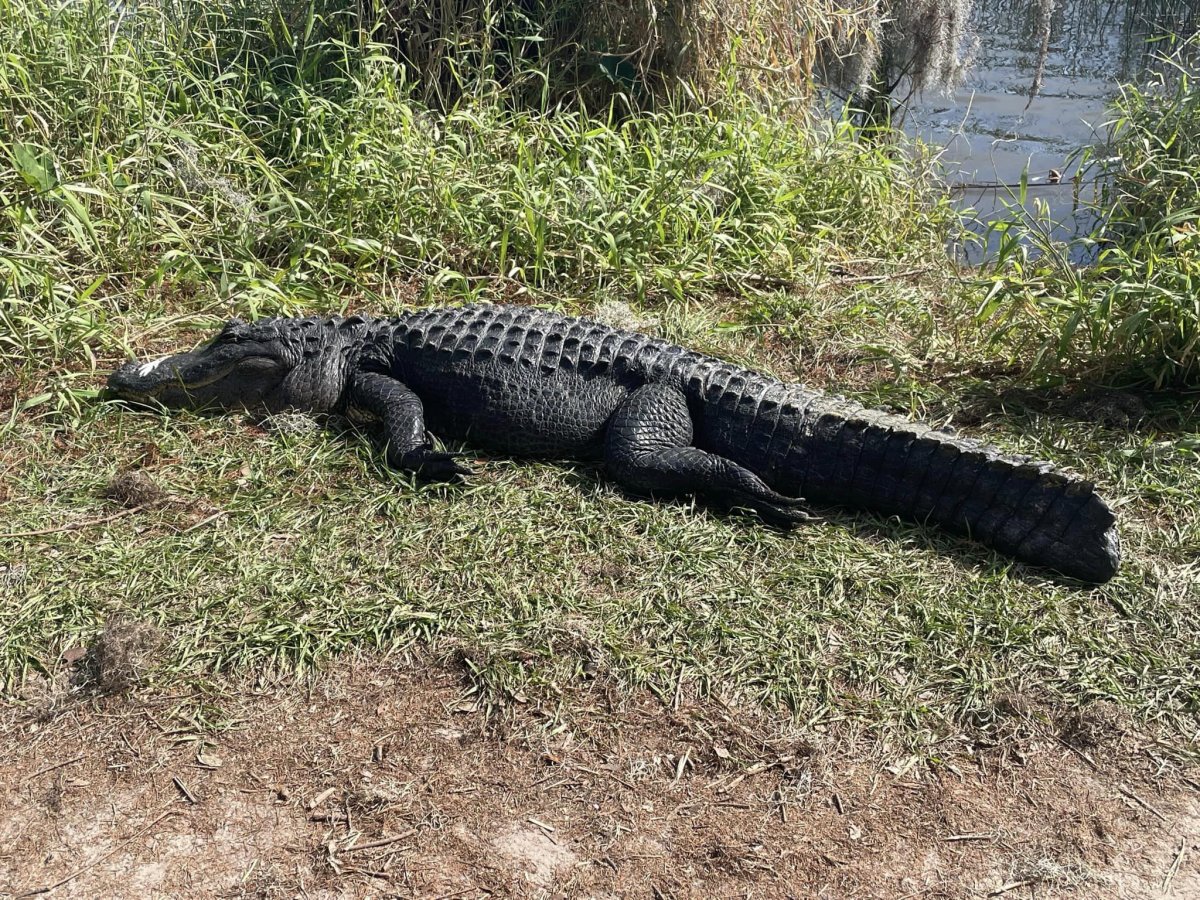A sleepy alligator was photographed with a white feather gently resting on its snout as it took a nap in Florida, to the amusement of the internet.
The alligator, which was between five and six feet long and missing part of its tail, seemed unperturbed as people walked past.
"We met this friendly little alligator friend at circle B bar reserve a few weeks ago," Amanda Braden posted to the Alligators of Florida Facebook group along with some pictures of the slumbering giant.

"I can't decide if the feather on his snoots is leftover from his breakfast, a overhead bird just happened to loss a feather as they were flying over him, or some brave ass human dropped it on his snoot. He was sunning himself right off the path and was definitely not interested in moving though. Dozens of people walked right on by him and he just laying sleeping. He also was missing a good portion of his tail and one of his left back feet so I assume a bigger gator had piece of him for snack at some point."
"Looks like he had a big meal and went into a food coma, needed a nap," commented one person under the post.
American alligators are large reptiles native to North America, being found across the southeastern states of the U.S. Males can grow to lengths of up to 15 feet from snout to tail, and weigh up to 1,000 pounds, while females only reach around 10 feet long at their largest.
This particular specimen may have lost a piece of its tail in a fight with another alligator.
"Sometimes when they lose their tails it happens when they're a young animal and they're a lot smaller," Jim Darlington, a curator of reptiles at St. Augustine Alligator Farm Zoological Park in Florida, told Newsweek. "It can happen during a dispute, like a territorial fight, or many injuries like that can happen when multiple animals are eating together on large prey and accidents happen. You won't see alligators fighting over food too often, but you may see more than 1 alligator trying to eat the same carcass."
Alternatively, the gator may have lost its tail to a less natural cause: humans.
"Missing such a large piece I'd say the tail was injured during a fight, or might have been run over by a vehicle," Susan Chapman, an associate professor of reptile and bird evolution at Clemson University, told Newsweek.

"Alligators frequently lose portions of their tails, especially when they are young. Trauma to the tail...caused by being bitten, or possibly crushed by a vehicle tire, etc. will frequently result in all of the tail distal to (beyond) the damaged part dropping off," Bruce Young, a reptile neurobiologist at A.T. Still University, told Newsweek. "Alligators, like many reptiles, have the ability to regenerate their tails, but the regeneration is a slow process, particularly in larger alligators."
While alligators can grow lost pieces of tail back, the older they are, the slower and less effective they are at regenerating their missing tail.
"The younger the alligator the more vulnerable to predators, such as birds, raccoons, other gators. I also think that the older the alligator is the less likely it is to regrow a lost part of its tail because regenerative capacity is lost with age," Chapman said.
This sleeping beast may therefore have had a traumatic past. While it may look peacefully asleep in the pictures, experts warn that alligators can turn nasty in the blink of an eye.
"In at least a few of the photos the alligator has at least one eye open. It's very likely aware of people and likely very used to people in the area," Darlington said. "It wants to absorb the sun and warmth and will likely do so as long as folks don't bother it. Keeping in mind, the alligator will decide exactly what's a bother and what isn't! Anyway....he looks awake to me. And even when they're sleeping, the "switch" is ON, so be careful!"
Alligator attacks on humans are relatively rare, but they do occur occasionally. Between 1948 and 2004, it is estimated that alligators attacked and injured a total of 376 people, and killed a further 15 people in the U.S. These fatal attacks often come after someone enters into a body of water where an alligator is present, but in rare cases, a person is dragged into the water by the alligator. Three people in Florida were killed by alligators in a single week in 2006.
"A 'napping' alligator can be a very dangerous thing, simply because there is little external evidence that an alligator is actually asleep," Young said.
"An alligator can close its eyes, and keep them closed, even though it is wide awake. In my experience alligators are like people in this regard, some of them are very easy to aggravate while others can be surprisingly tolerant....it is pushing the boundaries of the latter group that often gets people into trouble!"
Thankfully, Braden and her companions were unharmed by the alligator, which continued to nap in the sunshine.
Do you have an animal or nature story to share with Newsweek? Do you have a question about alligators? Let us know via science@newsweek.com.
Uncommon Knowledge
Newsweek is committed to challenging conventional wisdom and finding connections in the search for common ground.
Newsweek is committed to challenging conventional wisdom and finding connections in the search for common ground.
About the writer
Jess Thomson is a Newsweek Science Reporter based in London UK. Her focus is reporting on science, technology and healthcare. ... Read more





